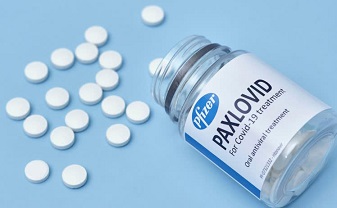Pharma News: Nirmatrelvir (A Key Component Of Paxlovid) Blunts Development Of Antiviral Adaptive Immune Responses In SARS-CoV-2 Infected Mice!
Pharma News - Paxlovid Nov 23, 2022 3 years, 3 months, 1 day, 19 hours, 16 minutes ago
Pharma News: A new study by Italian researchers has shockingly found that Nirmatrelvir which is a key component of the drug Paxlovid that is being peddled by American and British medical ‘experts’ to treat COVID-19 actually blunts the development of antiviral adaptive immune responses in mice infected with SARS-CoV-2!

According to the study team, this might help explain the virological and/or symptomatic relapse after treatment completion reported in many individuals taking the drug to treat COVID-19 infections.
The study team included scientists from IRCCS San Raffaele Scientific Institute, Vita-Salute San Raffaele University, University of Naples Federico II, Cittadella Universitaria di Monserrato, University of Milan and La Sapienza University.
In the current ongoing COVID-19 pandemic….. alongside vaccines, antiviral drugs are becoming an integral part of the response to the growing SARS-CoV-2 infections.
Nirmatrelvir, an orally available inhibitor of the 3- chymotrypsin-like cysteine protease, has been shown to reduce the risk of progression to severe COVID-19.
It is the key component of the drug, Paxlovid that is being peddled by medical ‘expert’s and ‘researchers’ who are most probably paid by the Pharma giants, to treat COVID-19 despite the fact that many front level physicians find it to be a useless drug that has a number of adverse issues including contraindications with many heart medications etc. Numerous past
Pharma News coverages have already covered on these issues.
https://www.thailandmedical.news/news/breaking-leading-cardiologists-and-doctors-from-massachusetts-issue-warning-of-adverse-drug-interactions-in-covid-19-patients-treated-with-paxlovid
https://www.thailandmedical.news/news/breaking-pfizer-has-stopped-enrollment-for-its-so-called-sars-cov-2-antiviral-drug-paxlovid-trial-in-standard-risk-population
https://www.thailandmedical.news/news/latest-danish-study-shows-that-mutations-e166v-and-l50f-e166v-on-sars-cov-2-variants-weakens-nirmatrelvir-a-component-of-paxlovid-mpro-binding
https://www.thailandmedical.news/news/breaking-sars-cov-2-ba-2-variant-spawning-mutations-on-its-mpro-sites-that-reduce-efficacy-of-the-antiviral-paxlovid-many-such-variants-in-america-no
thailandmedical.news/news/urgent-studies-needed-on-paxlovid-does-it-only-help-alleviate-symptoms-and-suppress-viral-load-for-a-while-but-does-not-help-in-total-viral-clearance">https://www.thailandmedical.news/news/urgent-studies-needed-on-paxlovid-does-it-only-help-alleviate-symptoms-and-suppress-viral-load-for-a-while-but-does-not-help-in-total-viral-clearance
To date, the impact of nirmatrelvir treatment on the development of SARS-CoV-2-specific adaptive immune responses is unknown.
The stud team by using a mouse model of SARS-CoV-2 infection, showed that nirmatrelvir administration early after infection blunts the development of SARS-CoV-2-specific antibody and T cell responses.
The study findings showed that upon secondary challenge, nirmatrelvir-treated mice recruited significantly fewer memory T and B cells to the infected lungs and to mediastinal lymph nodes, respectively.
Alarmingly, the study findings highlight a potential negative impact of nirmatrelvir treatment with important implications for clinical management and might help explain the virological and/or symptomatic relapse after treatment completion reported in some individuals.
The study findings were published on a preprint server and are currently being peer reviewed.
https://www.biorxiv.org/content/10.1101/2022.11.22.517465v1
Interestingly, in line with the results obtained for the humoral response, the study team found that the frequency and absolute number of IFN-gamma + and IFN-gamma – alongside TNF-alpha + SARS-CoV-2-specific CD8+ and CD4+ T cells were significantly lower in the lungs of nirmatrelvir-treated mice compared to vehicle-treated mice, 4 days after homologous re-challenge.
Also, humoral and cellular responses to SARS-CoV-2 were also reduced when nirmatrelvir treatment was initiated later (24 or 48 hours after infection) and when infection was performed with different SARS-CoV-2 variants.
It was however found that nirmatrelvir treatment of mice infected with unrelated viruses (i.e., vesicular stomatitis virus [VSV] and lymphocytic choriomeningitis virus [LCMV]) did not inhibit the development of antiviral adaptive immune responses, indicating that nirmatrelvir is not per se an immune suppressive drug.
The study team did not detect viral titers in the lungs of all but one nirmatrelvir-treated mouse after homologous re-challenge.
Similarly, infection of K18- hACE2 transgenic mice with the poorly pathogenic Omicron (B.1.1.529) variant did not allow the study team to evaluate clinical signs of disease.
The study team believes that the failure to observe decreased protection upon re-infection in mice treated with nirmatrelvir (despite a prominent reduction in adaptive immunity) has to do with the limitations of the experimental setup.
Future studies with different SARS-CoV-2 variants and/or doses should assess the impact of the reduced adaptive immunity caused by nirmatrelvir treatment on viral load and the severity of disease progression upon re-challenge.
In summary, the study findings indicate that nirmatrelvir treatment early after infection negatively impacts the development of adaptive immune response to SARS-CoV-2 in K18-hACE2 transgenic mice.
Though the mechanistic bases behind this observation were not addressed in this study, it is conceivable that this is due to insufficient antigen exposure (quantity and/or duration) of naïve B and T cells.
It is also worth noting that successful antimicrobial treatment does not inevitably result in reduced adaptive immune responses to any pathogen. For instance, treatment of mice infected with Listeria monocytogenes with amoxicillin early after infection did not significantly impair the development of T cell responses.
https://pubmed.ncbi.nlm.nih.gov/15494519/
https://pubmed.ncbi.nlm.nih.gov/11120806/
Also, treatment with antibiotics before L. monocytogenes infection allowed the development of functional antigenspecific memory CD8+ T cells in the absence of contraction.
https://pubmed.ncbi.nlm.nih.gov/15247915/
Hence, the effect of antiviral therapy on adaptive immunity probably depends on the impact of such treatment on several factors including not only pathogen replication but also duration of antigen expression and presentation, activation of innate immunity, etc.
Although claims by Western medical ‘experts’ with vested interests continue to support nirmatrelvir treatment for the prevention of severe 5 COVID-19 in high-risk individuals, the data reported here draw attention to a potential negative impact of this therapy.
Whether this effect is an exclusive feature of nirmatrelvir or whether forthcoming antivirals acting on SARS-CoV-2 would have similar effects should be addressed in future studies.
Though the mice do not reproduce the viral rebound observed in some patients treated with nirmatrelvir, the study team believes that the study findings might help explain the virological and/or symptomatic relapse after treatment completion reported in some individuals and should inform clinical and public health policies.
For the latest
Pharma News, keep on logging to Thailand Medical News.
